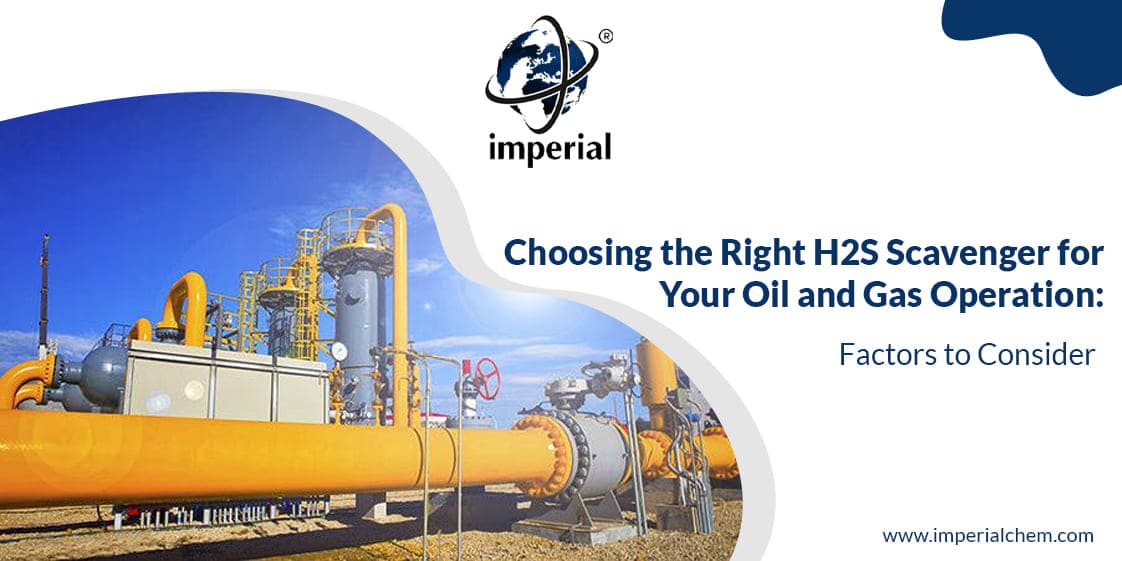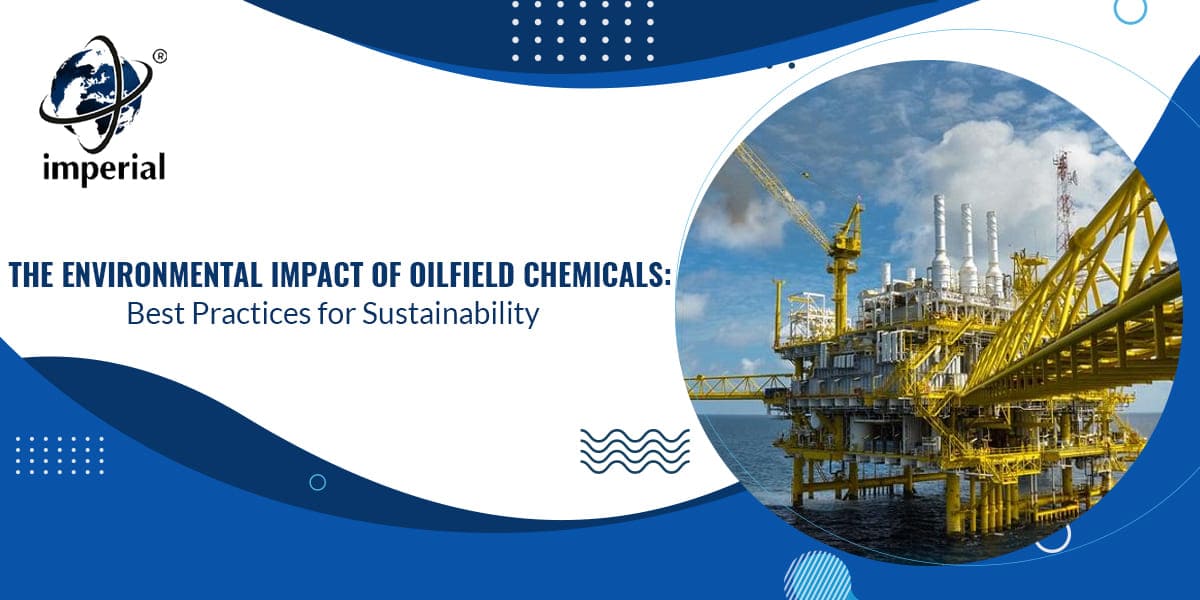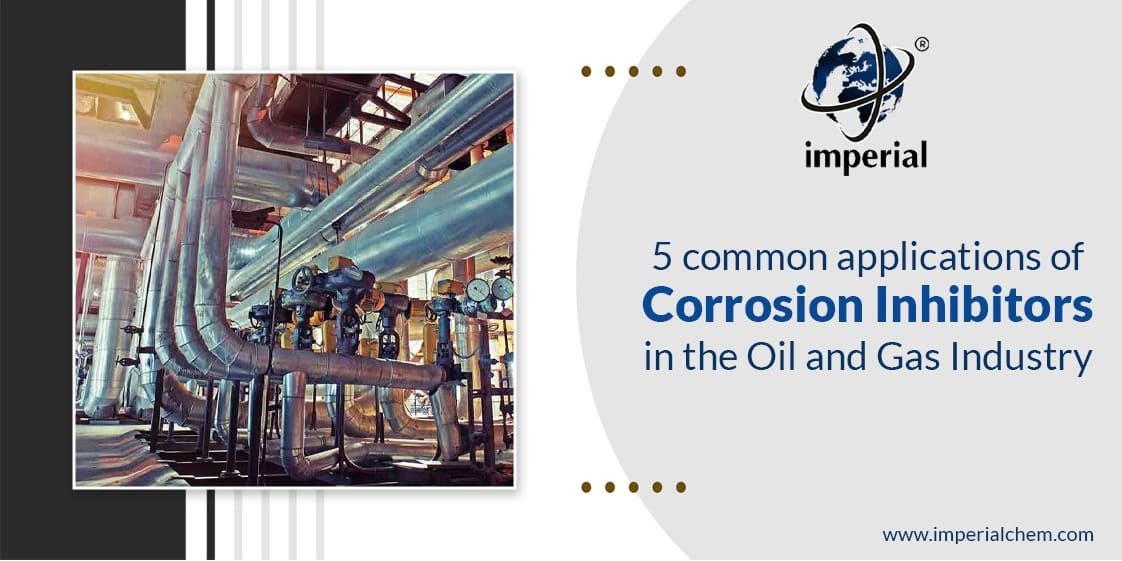- All Products
- Corrosion Inhibitor
- Oxygen Scavenger
- Drag Reducing Agent / Flow Improver
- H2S Scavenger
- Triazine
- Demulsifier
- Emulsion Breaker
- Surfactant
- Wax / Parrafin Disperssant
- Asphaltene Inhibitor

Blog Details

09
Jun
The Importance of Corrosion Inhibitors in Water Treatment Processes
What are corrosion Inhibitors?
Corrosion inhibitors play a crucial role in protecting various metal structures and components from the damaging effects of corrosion. They are chemical compounds that are designed to prevent or reduce the corrosion process by forming a protective barrier on the metal surface. Many Corrosion Inhibitors manufacturers in India like Imperial Oilfield Chemicals, are quite popular for providing quality oilfield chemical solutions to various industries across the globe.
Gujarat, known for its industrial prowess, is home to numerous companies specializing in producing and exporting corrosion inhibitors. These manufacturers employ advanced research and development techniques to create innovative formulations that effectively combat corrosion in diverse environments. Their products are designed to provide long-lasting protection, enhance the durability of metal structures, and minimize maintenance costs.
Corrosion inhibitor manufacturers in India , particularly in Gujarat, as the likes of Imperial Oilfield Chemicals, adhere to strict quality standards and employ state-of-the-art production facilities. They utilize cutting-edge technologies to formulate corrosion inhibitors that are tailored to meet the specific needs of different industries and applications. These inhibitors can be used in sectors such as oil and gas, petrochemicals, power generation, automotive, marine, and infrastructure.
As corrosion poses a significant threat to industrial equipment and infrastructure, Imperial Oilfield Chemicals - an excellent Corrosion Inhibitor exporter in Gujarat ensures that their products meet international standards and are readily available for global markets. They establish efficient supply chains to meet the demands of customers around the world, contributing to the growth and development of corrosion protection solutions on a global scale.
A noteworthy Corrosion Inhibitor supplier in Gujarat - Imperial Oilfield Chemicals, offers a wide range of products, including organic and inorganic inhibitors, passivators, and rust preventives. They work closely with customers to understand their specific requirements and recommend suitable corrosion protection solutions. These suppliers also provide technical support and guidance to ensure the effective application of corrosion inhibitors.
The Importance of Corrosion Inhibitors:
Corrosion inhibitors are chemical compounds that are essential for protecting metal structures and components from the damaging effects of corrosion. They play a vital role in various industries and applications by preventing or reducing the corrosion process.
Corrosion Inhibitor exporters in India utilize advanced research and development techniques to create effective formulations that can combat corrosion in diverse environments. These exporters employ state-of-the-art production facilities and adhere to strict quality standards to ensure the reliability and performance of their corrosion inhibitors.
Gujarat is a hub for industrial activity and corrosion inhibitor exporters in the region contribute to the growth and development of corrosion protection solutions not only in India but also in the global market. They ensure that their products meet international standards and are readily available for export to various countries. These exporters establish efficient supply chains to meet the demands of customers around the world, expanding the reach and impact of corrosion inhibitors.
Corrosion inhibitor suppliers in Gujarat play a crucial role in providing corrosion protection solutions to industries across the state and beyond. They offer many corrosion inhibitors, including organic and inorganic inhibitors, passivators, and rust preventives. These suppliers work closely with customers to understand their specific needs and recommend suitable corrosion protection solutions. They also provide technical support and guidance to ensure the effective application of corrosion inhibitors, helping customers achieve optimal results.
The importance of corrosion inhibitors cannot be overstated. Corrosion can lead to significant economic losses through equipment failure, maintenance costs, and production downtime. By utilizing corrosion inhibitors, industries can extend the lifespan of metal structures, reduce maintenance requirements, and improve operational efficiency. Corrosion inhibitors help in preserving the integrity and functionality of critical infrastructure, such as pipelines, tanks, and machinery, thereby ensuring safe and reliable operations.
In addition to preventing corrosion, inhibitors also offer environmental benefits. By reducing the need for frequent replacements and repairs, they contribute to resource conservation and waste reduction. Corrosion inhibitors aid in sustainable development by promoting the efficient use of materials and minimising the environmental impact associated with corrosion-related issues.
Different Types of Corrosion Inhibitors:
● Organic Inhibitors: Organic corrosion inhibitors are compounds derived from organic molecules such as amines, imidazolines, and fatty acids. These inhibitors form a protective film on the metal surface, preventing corrosion by blocking the access of corrosive agents. Organic inhibitors are widely used in industries such as oil and gas, petrochemicals, and water treatment.
● Inorganic Inhibitors:Inorganic corrosion inhibitors are typically mineral-based compounds such as phosphates, silicates, and chromates. These inhibitors work by forming insoluble precipitates or protective oxide layers on the metal surface, inhibiting the corrosion process. Inorganic inhibitors are commonly used in cooling water systems, boilers, and metal cleaning applications
● Passivators: Passivating corrosion inhibitors are substances that promote the formation of a passive oxide layer on the metal surface. This layer acts as a barrier against corrosion, enhancing the metal's resistance to further degradation. Passivators are often employed in stainless steel and other alloys to prevent pitting and crevice corrosion.
● Volatile Corrosion Inhibitors (VCIs): VCIs are compounds that release vapour-phase corrosion inhibitors, which protect metal surfaces even in enclosed spaces. These inhibitors vaporize and form a protective layer on the metal, preventing corrosion even in hard-to-reach areas. VCIs are commonly used for the protection of metals during storage, transportation, and packaging.
● Hybrid Inhibitors: Hybrid corrosion inhibitors combine the benefits of both organic and inorganic inhibitors. They are formulated by blending different compounds to achieve enhanced corrosion protection. Hybrid inhibitors offer improved performance in challenging environments and are frequently used in industries where high levels of corrosion resistance are required.
The Role of Corrosion Inhibitors in various industries:
Let's dive in and see how essential corrosion inhibitors are to various industries.
● Oil and Gas Industry: The oil and gas industry extensively uses corrosion inhibitors to protect pipelines, storage tanks, and equipment from corrosion caused by water, gases, and aggressive chemicals. Corrosion inhibitors ensure the integrity of infrastructure, minimize maintenance costs, and prevent environmental hazards.
● Petrochemical Industry: Corrosion inhibitors are vital in the petrochemical industry to protect metal equipment and structures from corrosion due to aggressive chemicals, high temperatures, and moisture. They help maintain the efficiency and reliability of processing units, storage tanks, and transport vessels.
● Power Generation: In the power generation sector, corrosion inhibitors are used to protect boilers, condensers, cooling systems, and piping from corrosion caused by water and steam. These inhibitors enhance the longevity of equipment, improve operational efficiency, and prevent unplanned downtime.
● Automotive Industry: Corrosion inhibitors are employed in the automotive industry to protect automotive components, such as engine parts, fuel systems, and cooling systems, from corrosion caused by moisture, road salts, and environmental factors. They ensure the durability and performance of vehicles, reducing maintenance requirements.
● Marine Industry: The marine industry relies on corrosion inhibitors to protect ships, offshore structures, and marine equipment from corrosion caused by seawater and atmospheric exposure. Corrosion inhibitors help prolong the lifespan of marine assets, improve safety, and reduce maintenance costs.
● Infrastructure: Corrosion inhibitors are crucial for protecting infrastructure assets like bridges, pipelines, water treatment plants, and buildings. They safeguard critical structures from corrosion caused by environmental factors, chemicals, and moisture, ensuring their structural integrity and longevity.
Corrosion inhibitor manufacturers in India like Imperial Oilfield Chemicals, develop advanced formulations and technologies to combat corrosion in various environments, helping industries maintain their operational efficiency, safety, and sustainability.
Imperial Oilfield Chemicals ranks among the top Corrosion inhibitor exporters in Gujarat that ensures the availability of high-quality corrosion inhibitors for domestic and international markets. We establish efficient supply chains, offer technical support, and provide timely delivery of corrosion inhibitors, contributing to the success of corrosion prevention efforts in different industries.
Why are Corrosion Inhibitors essential for Water Treatment Processes?
● Protection of Equipment: Water treatment processes involve the use of various metal equipment and components, such as pipes, valves, pumps, and tanks. These components are susceptible to corrosion when exposed to water, chemicals, and other contaminants. Corrosion inhibitors form a protective barrier on the metal surfaces, preventing the corrosion process and extending the lifespan of the equipment. By using corrosion inhibitors, water treatment facilities can avoid costly repairs, replacements, and downtime caused by corrosion-related failures.
● Maintenance of Water Quality: Corroded metal surfaces can release harmful substances and particles into the water, compromising its quality and making it unfit for consumption or industrial use. Corrosion inhibitors help maintain the integrity of metal surfaces, preventing the leaching of metals and contaminants into the treated water. This ensures that the water meets the required quality standards and remains safe for use.
● Prevention of Scale and Deposits: Corrosion inhibitors can also inhibit the formation of scale and deposits in water treatment systems. Scale and deposits can reduce the efficiency of equipment, hinder heat transfer, and promote the growth of bacteria and other microorganisms. Corrosion inhibitors can help prevent the precipitation and accumulation of scale-forming substances, ensuring optimal performance and minimizing the need for costly cleaning and maintenance.
● Minimization of Chemical Usage: Corrosion inhibitors can reduce the need for excessive chemical dosing in water treatment processes. By protecting metal surfaces from corrosion, they minimize the degradation of chemicals and reduce their consumption. This leads to cost savings in chemical usage while maintaining the effectiveness of the water treatment process.
● Regulatory Compliance: Water treatment facilities must adhere to strict regulatory standards for water quality and safety. Corrosion inhibitors play a vital role in meeting these standards by preventing corrosion and ensuring the integrity of water treatment equipment. By incorporating corrosion inhibitors into their processes, water treatment facilities can comply with regulatory requirements and avoid penalties or legal issues.
Cost-Effective Solutions for Maintenance and Repairs:
● Corrosion Inhibitors: Corrosion inhibitors are a cost-effective solution to prevent corrosion-related damage and extend the lifespan of metal structures and components. By applying corrosion inhibitors, industries can avoid costly repairs, replacements, and downtime associated with corrosion. Manufacturers, exporters, and suppliers of corrosion inhibitors in India, particularly in Gujarat, offer a range of affordable options that provide effective corrosion protection.
● Protective Coatings: Protective coatings act as a barrier between the metal surface and the corrosive environment, offering long-term protection against corrosion. These coatings are cost-effective because they provide durable and low-maintenance solutions, reducing the need for frequent repairs. Manufacturers and suppliers of corrosion inhibitors in Gujarat offer a variety of protective coatings that are specifically designed to be cost-effective and provide optimal corrosion resistance.
● Maintenance Planning and Scheduling: Proper maintenance planning and scheduling are essential for cost-effective maintenance and repairs. By implementing preventive maintenance strategies and conducting regular inspections, industries can identify and address corrosion-related issues in their early stages, minimizing the need for expensive repairs. Corrosion inhibitor suppliers in Gujarat can provide guidance and support in developing effective maintenance plans tailored to specific industry needs.
● Efficient Resource Management: Efficient resource management is crucial for cost-effective maintenance and repairs. This includes optimizing the use of corrosion inhibitors, coatings, and other materials. Corrosion inhibitor exporters in Gujarat can offer guidance on the appropriate application of corrosion inhibitors, ensuring their efficient use and minimizing waste. By using the right amount of inhibitors and coatings, industries can achieve cost savings while maintaining effective corrosion protection.
● Training and Technical Support: Proper training and technical support can contribute to cost-effective maintenance and repairs. Manufacturers and suppliers of corrosion inhibitors in India, including those in Gujarat, often provide training programs and technical support to assist industries in the correct application and maintenance of corrosion protection solutions. Well-trained personnel can identify and address corrosion issues early on, preventing costly damages and repairs.
Final Thoughts:
Corrosion inhibitors are essential for water treatment processes due to their ability to protect equipment, maintain water quality, prevent scale and deposits, minimize chemical usage, and ensure regulatory compliance. By incorporating corrosion inhibitors into their operations, water treatment facilities can enhance the efficiency, reliability, and sustainability of their processes, ultimately providing clean and safe water for various applications.











